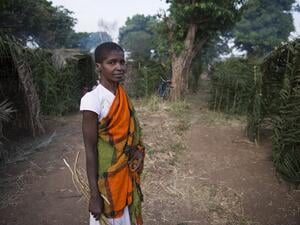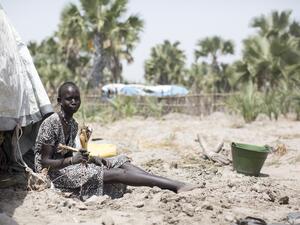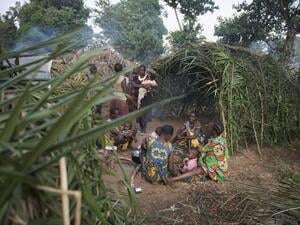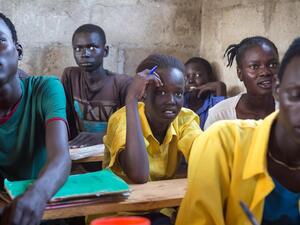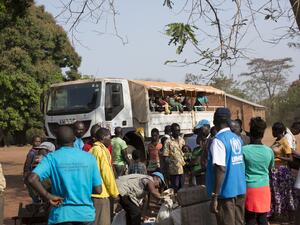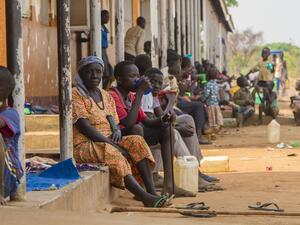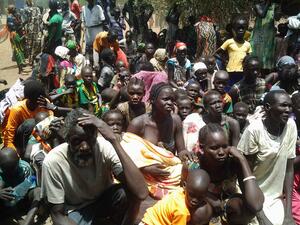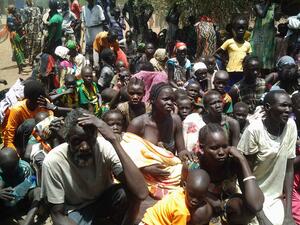Young refugee sisters survive on wild grass as they trek alone to safety
Young refugee sisters survive on wild grass as they trek alone to safety

Two sisters who fled South Sudan alone (in yellow and red on left) pose with their "foster family" inside a UNHCR communal shelter on the border inside Ethiopia.
GAMBELLA, Ethiopia, 25 July (UNHCR) -- Twelve-year-old Nyawech Chuol can barely stop sobbing long enough to tell the story of the night South Sudan's civil war came to her home. She and her eight-year-old sister, Nyalouk, traumatized into silence, lost their family after a gun battle - and now they are completely alone in a foreign land.
Nyawech says they were fast asleep some weeks ago when the conflict that has swept South Sudan for the last seven months reached her village, Matiang, in Upper Nile State.
"It was very dark in the night and we were all sleeping when we heard heavy gun shots," she says, speaking through an interpreter at a crowded reception centre on the Pagak border crossing just inside Ethiopia.
"I only remember putting on my dress, grabbing my younger sister by the hand and running out of the house in the darkness." The family ran in different directions, and she hasn't seen any relatives since.
"When day light came and I saw only Nyalouk with me, I realized that my father, my mother and my two elder sisters were not with me and I cried a lot," she says, as the tears flow again.
Even though she was only 12, Nyawech took her younger sister in hand and followed strangers heading for safety in Ethiopia. She's not sure how long they walked to get here, but others have walked weeks to find safety.
What she does know is that they arrived very hungry and extremely dehydrated. All they had to eat along the way was wild grass and leaves. All they drank was dirty pond water.
The two girls are among the growing number of children on their own streaming into the western Ethiopian state of Gambella every day. Some have been lucky enough to meet their parents and relatives once they get to the three nearby refugee camps. But there are also more than 1,500 unaccompanied minors and some 5,540 children separated from their families living in the camps, looked after by other refugees.
The 177,000 South Sudanese refugees in the camps (run by UNHCR and the Ethiopian government) are overwhelmingly women and children. And the camps have quickly reached full capacity.
"The Ethiopian Government has given us an additional site, which we are developing," says Oscar Mundia, UNHCR's senior emergency coordinator in Gambella. "But with more than 12,000 refugees in two reception centers awaiting relocation and 883 new refugees arriving every day, the new site [can be considered] half full before it is even opened."
UNHCR is especially worried about children on their own, says Mundia. "We are working closely with our partners to identify and properly register minors right at the border," he says. Other priorities are tracing their families and getting children into proper care arrangements.
Nyawech and Nyalouk were lucky on this score. Soon after they crossed the border, a mother of four, Nyanyik Thot, took them under her wing. Their new "foster mother" was from their own village, but had not previously known either the girls or their parents.
"I immediately decided to take care of the kids because I thought my own children could have met the same fate," she says simply. The new expanded family is living temporarily in a huge, overcrowded communal hangar with some 100 other people. In all, some 5,000 people are living in hangars at Pagak, waiting to move on to the camps.
"We are so grateful to Nyanyik for volunteering to take care of the two sisters, despite having her own four young children who also need a lot of attention," says Valerie Laforce, UNHCR's field officer in Pagak.
Between sobs, Nyawech's thoughts turn to her old life and the games they used to play. "I would like to go back home," she says quietly. "I would like to meet my family and play hopscotch and jump rope with my friends."
By Kisut Gebreegziabher in Gambella.

